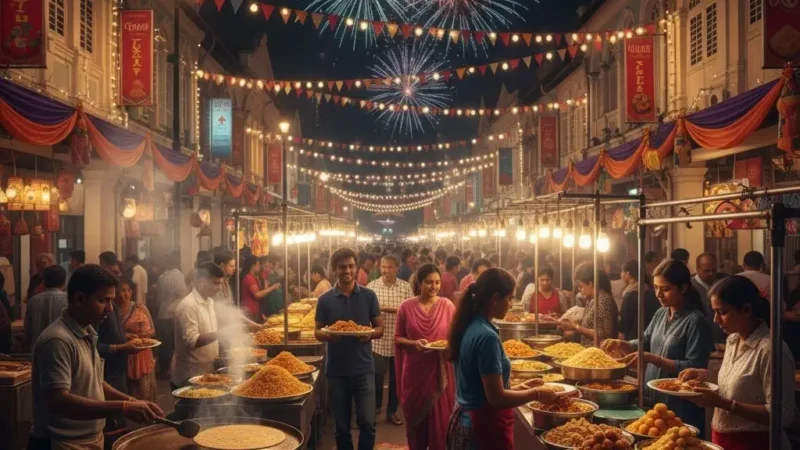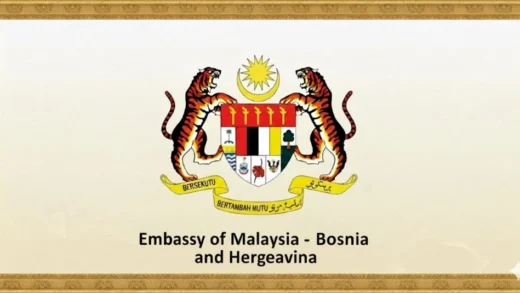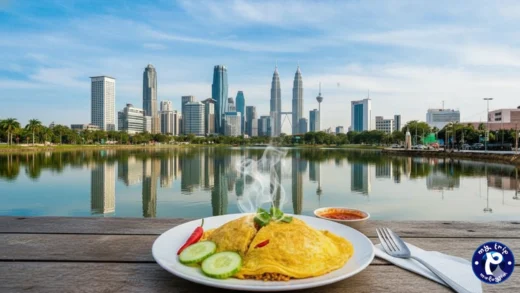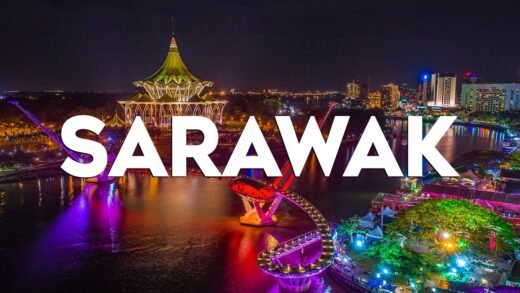Street Food Adventures During Deepavali in Malaysia

Introduction
Deepavali, also known as the Festival of Lights, is a major celebration for the Indian community in Malaysia. Steeped in religious and cultural significance, Deepavali commemorates the triumph of light over darkness and good over evil. Over the years, Malaysian Deepavali celebrations have evolved into lively community events, blending traditional rituals with festive street food, decorations, and family gatherings.
This guide explores Deepavali traditions in Malaysia, regional variations, and the best places to experience the festival, including street food adventures across Penang, Kuala Lumpur, Johor, and Ipoh.
The Origins and Significance of Deepavali in Malaysia
The Indian community, primarily of Tamil origin, introduced Deepavali to Malaysia centuries ago. Traditionally, the festival celebrates Lord Rama’s return to Ayodhya after defeating Ravana, symbolizing the victory of light over darkness.
Today, Malaysian Indian festival celebrations combine religious rituals with cultural festivities. Families clean and decorate their homes, light diyas (oil lamps), create rangoli patterns, and exchange sweets. Temples like Batu Caves in Selangor and Sri Mahamariamman Temple in Kuala Lumpur serve as central hubs for devotional activities, including prayers, processions, and community events.
Traditional Deepavali Customs and Family Practices
Home Preparations and Decorations
In Malaysia, Deepavali preparations begin with thorough home cleaning and decorating entrances with intricate kolam or rangoli patterns. Diyas are placed throughout homes, symbolizing light overcoming darkness and attracting prosperity. Families also purchase new clothes and jewelry, enhancing the festive atmosphere.
Rituals and Prayers
Deepavali rituals include Lakshmi Puja, offering prayers to Goddess Lakshmi for wealth and well-being. Families visit local temples to perform pujas and receive blessings. Extended families often gather for communal meals and exchange prasadam (sacred offerings), reinforcing community bonds.
Regional Variations Across Malaysia
- Penang: Famous for bustling street bazaars, Penang offers colorful stalls selling sweets, snacks, and handicrafts. Local favorites include murukku, laddu, and kaju katli.
- Kuala Lumpur: The Little India area in Brickfields is the epicenter of Deepavali, featuring lights, cultural performances, and street food stalls.
- Johor: Emphasizes cultural performances alongside Deepavali street food fairs. Temples like Arulmigu Sri Rajakaliamman Glass Temple host communal feasts.
- Ipoh: Offers family-oriented celebrations with traditional sweets, snacks, and temple visits.
Street Food Adventures During Deepavali
Street food is an essential part of Malaysian Deepavali culture. The vibrant markets and stalls provide a sensory feast for locals and visitors.
Must-Try Street Foods
- Murukku: Crispy, spiral-shaped snacks made from rice and lentil flour, seasoned with cumin or chili.
- Samosas and Vadai: Deep-fried pastries and lentil fritters filled with spiced potatoes and vegetables.
- Traditional Sweets: Favorites include laddu, mysore pak, and gulab jamun.
- Banana Chips and Mixture: A crunchy blend of fried snacks, nuts, and spices.
- Street Beverages: Refreshing drinks like teh tarik and coconut water complement festival foods.
Popular Deepavali Markets
- Little India, Kuala Lumpur: Offers extensive street food trails, cultural performances, and festival shopping.
- Penang Street Food Bazaars: Showcase a fusion of Indian, Malay, and Chinese flavors.
- Johor Bahru Town Center: Features food stalls and cultural activities by local Indian communities.
- Ipoh Old Town: Combines traditional snacks with family-friendly celebrations.
Temples as Cultural Hubs
Temples play a central role in where to celebrate Deepavali in Malaysia. Batu Caves attracts thousands of devotees with its towering Lord Murugan statue, elaborate lighting, and festival rituals. Sri Mahamariamman Temple in Kuala Lumpur is Malaysia’s oldest Hindu temple, offering vibrant Deepavali displays, floral decorations, and communal prayers. Visiting these temples provides insight into Malaysian Deepavali history and culture.
Conclusion
Deepavali in Malaysia is a dazzling celebration of light, culture, and community. From temple rituals and family customs to bustling street food markets, the festival offers an immersive experience for all. Exploring Deepavali street food in Penang, KL, Johor, and Ipoh allows visitors to savor authentic flavors while witnessing centuries-old traditions. Whether enjoying murukku at a street bazaar or admiring diyas at Batu Caves, Malaysian Deepavali promises an unforgettable cultural adventure.





Comments are closed.